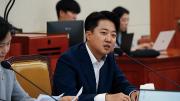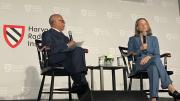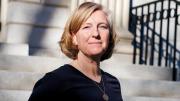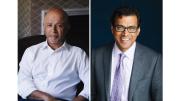Updated Friday, March 1, at 9:45 a.m. with membership of HarvardX research committee and guiding principles for HarvardX courses (see below).
The University has populated some of the administrative and faculty committees that oversee and manage HarvardX (the University’s operating entity for its online initiative) and Harvard’s relationship with edX, the joint venture with MIT to which Harvard has committed significant resources to develop online learning technologies. The unveiling of the committees' composition follows by about nine months the launch of edX in May 2012, and comes at a time of rapid expansion of online course development. (See also "Online Evolution Accelerates" for an update on spring 2013 courses, course development, and broader faculty perspectives on the online initiative; and “Classroom in the Cloud,” for a report on edX’s fall 2012 classes, including the online version of Harvard’s popular CS50 introductory computer-science class.)
A roster appears below. It consists of these bodies:
- HarvardX Leadership Group, the University’s senior decisionmaking body
- HarvardX Faculty Committee, the academic entity that, significantly, discusses courses to be developed and distributed on the edX platform, and reviews curriculum policy, issues concerning course credit, and other academic matters
- HarvardX Support Team, an implementation and support subset of the Leadership Group
Still to come are a research committee, which will oversee and support the analyses and evaluations of online initiatives—at least in part to apply what is learned to in-class, on-campus instruction and learning; and the membership of the edX board of directors, and of its partnership subcommittee, which oversees identification and admission of new member institutions (a recent expansion has brought the number of affiliates to a dozen).
A review of the initial committee members suggests:
The scope and seriousness of Harvard’s engagement with the edX initiative. The provost, executive vice president, two vice presidents, and two deans are involved in the senior leadership group (although education dean Kathleen McCartney, who has been appointed president of Smith College, will be departing).
The engagement of faculty members who are already interested in and experienced with digital technologies, online learning, and innovative teaching. Among them are such senior professors as Peter Bol, who has led the Faculty of Arts and Sciences’ (FAS) efforts in developing and deploying geographical information systems, helped create a Chinese historical biographical database, and used extensive digital resources in his own graduate and undergraduate teaching; Michael Sandel, whose “Justice” course has been recorded and broadcast worldwide, and now features online, interactive, international student participation in classes—live; and Gary King, who leads the Institute for Quantitative Social Science and has used online technologies in his own teaching. Bol is developing a HarvardX version of a Chinese history General Education course, in part by engaging students this semester in a technology-focused, for-credit class. And Sandel's HarvardX version of "Justice" begins on the edX platform on March 12.
Among interesting professors of practice at the University, Robert Lue figures heavily in HarvardX leadership. Somewhat of a teaching polymath, he played a key role in overhauling the College’s introductory life-sciences courses, a model (duplicated since in other sciences) meant to make the field immediately engaging to a broad range of students considering biological studies. He has also been involved, as a former dean, in leading Harvard’s summer school, which has broadened its curricular offerings and engaged more faculty in teaching courses abroad; in the University’s “education portal” serving the community in Allston; and in developing online, three-dimensional animations of biological processes as teaching and research tools. In other words, as a professor of practice, Lue’s focus has been on teaching rather than on research; and he has obviously plunged into a diverse array of innovative teaching and managerial roles during the past decade. In apparent recognition of these interests and skills, he was just appointed the first faculty leader of FAS's Derek Bok Center for Teaching and Learning. He will combine that work with his continuing HarvardX responsibilities.
Lue's trajectory is thus somewhat similar to that of David Malan, the instructor whose Computer Sciences 50 course has proven wildly popular with undergraduates and, in its CS50x version, became one of the first two Harvard courses offered on edX this fall, attracting an enrollment in the tens of thousands worldwide. Malan’s titles are also indicative of a new breed of faculty member: senior lecturer on computer science, director of educational innovation, and manager of pedagogical innovation.
With Lue now linking FAS's teaching center to HarvardX and edX, and the newly appointed dean of the Division of Continuing Education (DCE), Huntington D. Lambert, arriving with extensive online experience, the reach of such technologies across the campus and in virtual education begins to become apparent.
Multidisciplinary reach. The members of the faculty committee, for example, include representatives from FAS, Harvard Medical School, Harvard School of Public Health, Harvard Graduate School of Education, Harvard Law School, Harvard Kennedy School, the School of Engineering and Applied Sciences, and the DCE. Beyond whatever applications of online-teaching and -learning techniques may be made in their Cambridge and Boston classrooms, most of the professional schools and DCE conduct large, often global, and frequently very profitable continuing- and executive-education operations—an important educational and financial opportunity for HarvardX and edX.
Staffing for the long haul. Members of the support group include not only the expected leaders in academic computing and information technology, but also communications and development experts—suggestive of a major effort consistent with the University’s announced intention of committing up to $30 million to fund its participation in edX.
HarvardX Leadership Group
- Alan Garber, Provost
- Katie Lapp, Executive vice president
- Michael D. Smith, Dean, Faculty of Arts and Sciences (FAS)
- Kathleen McCartney, Dean, Harvard Graduate School of Education (HGSE)
- Anne Margulies, Vice president, University chief information officer, and interim executive director for HarvardX
- Robert A. Lue, Professor of the practice of molecular and cellular biology; faculty director of HarvardX and HarvardX faculty committee chair; and director of the Bok Center (FAS)
- Andrew D. Ho, Assistant professor of education; research director of Harvard X (HGSE)
- Robert W. Iuliano, Vice president and general counsel
HarvardX Faculty Committee
- Peter Bol, Carswell professor of East Asian languages and civilizations (FAS)
- Earl Cook, Professor of epidemiology (Harvard School of Public Health, HSPH)
- Suzanne Cooper, Stokey senior lecturer in public policy, academic dean (Harvard Kennedy School, HKS)
- Jules Dienstag, Walter professor of medicine, dean for medical education (Harvard Medical School, HMS)
- David Golan, Minot professor of medicine, dean for graduate education (HMS)
- Heather Hill, Professor of education (HGSE)
- David Hunter, Gregory professor of cancer prevention, academic dean (HSPH)
- Gary King, Weatherhead University Professor (FAS)
- Henry Leitner, Senior lecturer on computer science, chief technology officer for Division of Continuing Education and FAS
- David Malan, Senior lecturer on computer science (School of Engineering and Applied Sciences, SEAS)
- Martha Minow, Dean, Harvard Law School (HLS)
- Michael Sandel, Bass professor of government (FAS)
- Jeannie Suk, Professor of law (HLS)
HarvardX Support Team
- Paul Andrew, Assistant vice president, communications, Harvard Public Affairs and Communications (HPAC)
- Valerie Beilenson, Project manager, HarvardX
- Nina Collins, Associate dean and senior advisor to the dean (FAS)
- Samantha Earp, Managing director, academic technology services
- Perry Hewitt, Chief digital officer, HPAC and Alumni Affairs and Development
- Andrew D. Ho (see above)
- Jonathan Hulbert, University attorney
- Sarah Karmon, Deputy chief of staff for the provost
- Robert A. Lue (see above)
- Anne Margulies (see above)
- Mary Beth Pearlberg, Assistant vice president, University Development Office
- Michael Rutter, Communications director, HarvardX (HPAC)
- Bradford Voigt, Director of principal gifts for the arts at Harvard
- James H. Waldo, Chief technology officer; McKay professor of the practice of computer science
HarvardX Research Committee
As part of the online initiative, Harvard has emphasized the importance of research on and evaluation of the learning and teaching effectiveness of online tools, course content, and other innovations. To that end, a research committee, chaired by Andrew Ho (see above) has been organized, drawing on diverse faculties. The membership, released in late February, is:
- Bharat N. Anand, Byers professor of business administration, Harvard Business School
- Joseph K. Blitzstein, Professor of the practice in statistics (FAS)
- Mary Brinton, Reischauer Institute professor of sociology (FAS)
- Thomas Kane, Professor of education and economics (HGSE)
- Gary King, Weatherhead University Professor, director of quantitative social-sciences research centers, and an online innovator in his own teaching
- Dan Levy, Senior lecturer in public policy (HKS)
- Bridget Terry Long, Xander professor of education and economics (HGSE)
- Xiao-Li Meng, Dean, Graduate School of Arts and Sciences, past chair of statistics, and a leading figure in efforts to improve teaching
- Fernando Reimers, Ford Foundation professor of international education (HGSE)
- Daniel Schacter, Kenan professor of psychology (FAS)
- Jeffrey Schnapp, Professor of Romance languages and literatures (FAS); director, metaLAB (at) Harvard; director, Berkman Center for Internet & Society, a leader in digital humanities
- Margo Seltzer, Smith professor of computer science (SEAS)
- Judith Singer, Conant professor of education (HGSE), a leading scholar in statistics and evaluation, and the University's senior vice provost for faculty development and diversity
The "guiding principles" for HarvardX courses, also recently promulgated, emphasize the breadth and diversity of disciplines and ways of knowing represented by all the University's schools; the array of learning and curricular approaches; and the importance of enhancing learning opportunities for all Harvard students.
For details, see the HarvardX website and its "contacts" page.









